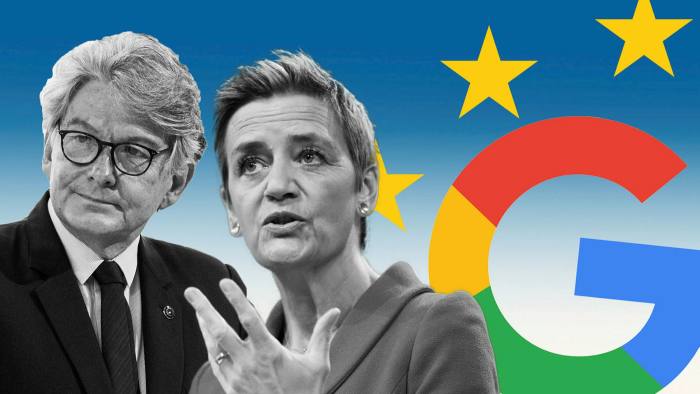In a ruling that has reverberated across the global tech industry, the European Court of Justice (ECJ) has dismissed Google’s appeal, confirming the original €2.4bn fine imposed by the European Commission (EC) in 2017. This penalty was issued after the Commission concluded that Google had unlawfully favored its own shopping comparison service over its rivals, using its dominant position in the online search market to stifle competition.
The fine, levied in 2017, was the largest the Commission had ever imposed at the time, though it has since been eclipsed by a €4.3bn penalty handed down to Google in 2018 over its Android operating system. Despite this, the €2.4bn fine remains a significant benchmark, symbolizing Europe’s tough stance on antitrust enforcement against Big Tech.
The Long Road to Justice: Foundem’s Complaint
The origins of the case trace back to 2009 when British shopping comparison website Foundem filed a complaint with the European Commission. The case claimed that Google had systematically abused its market dominance by making its own shopping recommendations more prominent in search results, relegating competitors like Foundem to obscurity. This manipulation severely impacted rivals’ traffic and undermined fair competition in the sector.
At the core of the complaint was the allegation that Google had effectively monopolized the online shopping comparison space, giving its own services unfair visibility at the expense of smaller competitors. Google’s defense, which centered on arguments that the claims lacked legal and economic merit, failed to convince both the European Commission in 2017 and the ECJ in its latest ruling.
ECJ’s Judgment: A Major Blow for Google
The ECJ’s judgment, delivered today, marks the conclusion of Google’s appeals process. The court sided with the European Commission, stating that Google’s conduct was “discriminatory” and its appeal must be “dismissed in its entirety.” In addition, the ECJ ordered Google, along with its parent company Alphabet, to cover its own legal costs as well as those incurred by the Commission.
Google expressed disappointment in the ruling, but also pointed out that it had already made changes to its shopping service in 2017 to comply with the Commission’s original decision. According to a company statement, Google’s approach since then has “worked successfully for more than seven years, generating billions of clicks for more than 800 comparison shopping services.”
A Victory for Fair Competition
For Google’s rivals, the ruling is being hailed as a significant win for consumer choice and competition in the digital marketplace. Kelkoo, one of the shopping comparison sites involved in the complaint, celebrated the ruling on social media, calling it a “victory for fair competition.”
Anne Witt, a law professor at EDHEC Business School’s Augmented Law Institute, described the ruling as “an important judgment,” stating that it exhausts Google’s legal remedies in this case. Witt further noted that Google could face further challenges as multiple follow-on lawsuits from parties claiming damages due to the tech giant’s anticompetitive behavior are already pending in national courts.
Google’s Broader Legal Troubles: A Global Trend
The European Commission’s case is far from the only legal battle Google faces. The tech giant has been under increasing scrutiny worldwide, as regulators crack down on its market practices. In 2018, the EU slapped Google with a €4.3bn fine over allegations that it used its Android mobile operating system to unfairly promote its own apps. The following year, Google faced another fine of €1.5bn for blocking advertising from competing search engines.
The European Union is currently investigating Google’s preferential treatment of its own services under the Digital Markets Act, and if found guilty, Google could be fined up to 10% of its annual global turnover. In addition to Europe’s regulatory actions, the U.S. government has also taken Google to court over alleged monopolistic practices in its advertising technology business, a trial that is still ongoing.
Just last week, UK regulators provisionally concluded that Google had employed anti-competitive tactics to dominate the online advertising technology market. The cumulative impact of these global legal challenges has placed Google at the center of the conversation around Big Tech’s power and the role of government in regulating these enormous digital platforms.
Implications for the Future: What’s Next for Google and Big Tech?
Today’s ruling signals a broader trend in Europe’s increasingly aggressive approach to regulating Big Tech, particularly when it comes to antitrust and competition laws. The European Commission has consistently targeted Google for abusing its dominant position, issuing fines that collectively amount to over €8.2bn.
The decision also sets a precedent for how authorities around the world may handle antitrust violations in the tech sector. As Professor Witt pointed out, the ruling opens the door to further claims for compensation from companies harmed by Google’s practices. These follow-on actions could cost the tech giant billions more.
Meanwhile, other tech giants such as Amazon, Apple, and Facebook (Meta) are also under the microscope, facing similar antitrust cases. In fact, in a separate judgment today, the ECJ ordered Apple to repay €13bn in unpaid taxes to Ireland, reinforcing the message that Europe will not hesitate to hold tech giants accountable for their actions.
Conclusion: A Watershed Moment for Competition in the Digital Age
The upholding of Google’s €2.4bn fine underscores the European Union’s commitment to ensuring fair competition in the digital marketplace. As consumers and competitors look toward a future where tech giants face greater regulation and accountability, today’s ruling marks a significant turning point.
For Google, the judgment may be the final chapter in a long-running legal saga, but it likely foreshadows more intense scrutiny and regulatory pressure on the company and its peers in the years to come.
As the world continues to grapple with the immense power wielded by Big Tech, the outcome of this case will undoubtedly serve as a milestone for policymakers, consumers, and competitors alike.
